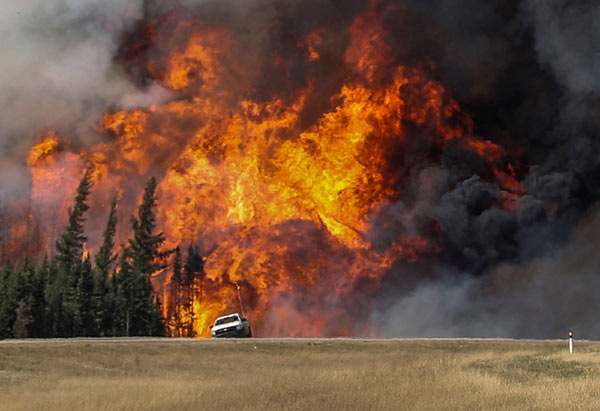CALGARY, Alberta - A massive wildfire raged near Fort McMurray, Alberta on Tuesday and threatened major oil sands production facilities, forcing the evacuation of thousands of workers and prolonging a shutdown that cut Canadian oil output by 1 million barrels a day.
|
 |
|
Smoke and flames from the wildfires erupt behind a car on the highway near Fort McMurray, Alberta, Canada, May 7, 2016.??[Photo/Agencies] |
The fire jumped a critical firebreak late Monday where plants and trees had been removed to stop its spread, moving north of Fort McMurray into oil sand camp areas. Some 8,000 workers were evacuated in the heavily forested northern part of the province.
The wildfire was taking a toll on the province's economy, with one study estimating the lost oil production would cut gross domestic product (GDP) by more than C$70 million a day.
The uncontrolled blaze covered 355,000 hectares (877,224 acres), up from 285,000 hectares on Monday. The fire on Tuesday burned a 655-room lodge for oil sands workers about 35 km (20 miles) north of Fort McMurray and threatened other housing.
High temperatures and winds were working against firefighters, and the fire was forecast to move to the east, putting oil operations in its path, officials said.
None of the oil sands have caught fire, and the industry was redoubling efforts to ensure facilities were well-protected, said Alberta wildfire manager Chad Morrison.
"Because of the cleared vegetation, lots of gravel on site and because they have an industrial firefighting service on site that understands this ... we feel fairly confident the sites themselves will be OK," Morrison told a news conference.
The lost Canadian production of 1 million barrels a day represents about one-quarter of total Canadian output. Canadian crude oil prices strengthened in light trading on Tuesday and Global oil prices touched a six-month high, with the Alberta outages among factors lending support.
Alberta Premier Rachel Notley said westerly winds were expected to push the fire closer to facilities operated by Suncor Energy Inc, one of the area's biggest operators, and Syncrude, majority owned by Suncor, on Tuesday.
Suncor started an orderly shutdown of its base plant operations and said its Firebag facility will move to minimal essential personnel, while Syncrude has evacuated the majority of its workforce to Edmonton but left a minimum staff of some 100 people at its Mildred Lake upgrader and Aurora Mine.
The fire also threatened Enbridge Inc's Cheecham crude oil tank farm south of Fort McMurray, but Notley said the fire line built there has held and winds were blowing away from the facility.
TransAlta Corp's Poplar Creek cogeneration power plant, operated by Suncor and providing power to its site, was also shut by early Tuesday due to the wildfire.
17 WILDFIRES IN PROVINCE
In Ottawa, federal Natural Resources Minister Jim Carr said he planned to have talks soon with energy companies to assess the damage from but gave no further details.
Prior to the latest setback, lost oil production was expected to average about 1.2 million barrels a day for 14 days, or roughly C$985 million ($763 million) in lost real GDP, according to the Conference Board of Canada.
Notley said the Conference Board's numbers were in the range of the government's estimates.
The premier added that the province has not underestimated the fire and had the resources to fight the fire. There are nearly 1,800 firefighters fighting 17 wildfires across the western Canadian province, with four of them out of control.
Canada has declined help from allies including the United States and Australia. Federal Public Safety Minister Ralph Goodale said Ottawa had full confidence in Alberta's ability to fight the blaze.
Fort McMurray's roughly 90,000 residents were forced to flee nearly two weeks ago as the fire raged through neighborhoods and destroyed about 10 percent of the city's structures.
With new explosions in the city damaging 10 homes and hot spots still a risk, Notley is not yet allowing residents to return.